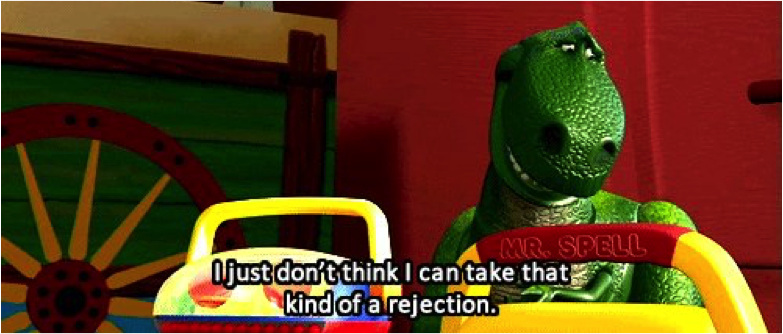It’s interview season, which is a complex combination of excitement and stress. And no matter how much effort you put into preparing for case studies, reviewing notes, brushing up on interview skills, or customizing resumes, you can still get “the news” that you were not selected for a job. What can happen next is what I refer to as the four stages of job rejection grief.
Stage 1. Emotional
“But, I thought the interview went great!” All the emotions start to flood your cerebellum and leak into your cerebral cortex; I’m no brain surgeon but I think that is how it works. You try to confide in others, but it does not fill the void of answering the question “why not me?” You may start to regret the actions you took in the interview, and wish you could just get one more chance. With a heavy heart, you send the thank-you-for-the-opportunity email and spend the night eating junk food and binge-watching Friends.
Remember: Not getting the job does not necessarily mean you bombed the interview or did not have the desired skill set. Maybe it was just not the right fit. Although impossible to come to this realization right away, it’s still only stage one, you have more stages to go!

Stage 2. Anger
The “why not me” in this stage soon turns to a “WHY NOT ME !?” You start to feel negative towards yourself or how the interview was conducted given the firm’s prestigious analytical backing. You become frustrated with yourself with how you answered certain questions or why those questions may have been asked. This is a rough stage, and is something you should talk about to close friends and NEVER EVER express on social media.
Stage 3. Silence
In this stage you do not want to hear about the company. The mere mention of their name or how someone you knew got an offer could send you back a stage. You may try to listen to music, reorganize, and dive into work. You may even avoid looking at the calendar to see who may be coming in next week, in fear of seeing “that company who should not be named” on the list.
Stage 4. Acceptance
You have come to terms with the company’s decision in this stage. You agree it probably was not the best fit right now, and leave the possibility open for interviewing with them again when the time is right. You accept that a lot of things can happen that will transform who you are. Eventually, you may look back on the impact this interview had on your career choice.
So don’t worry. Even though we may feel emotional, angry, or closed off for a couple of days, we are only feeling this because we are so enthusiastic about a career in data analysis. We should take each interview as a chance to grow in this fast-paced world. Arthur Rubinstein said, “of course there is no formula for success except, perhaps, an unconditional acceptance of life and what it brings.” I think there is a lot of validity in this statement. We need to have the habit of looking at whatever happens in the interview process through a positive mindset instead of a defeatist one, acknowledging the stages, and dealing with them as they come. After all, success is a journey, not a destination.
Columnist: Matt Russell

